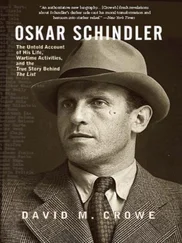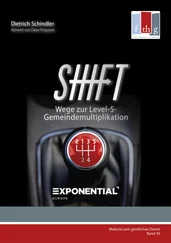Oskar murmured away in that peculiar rumble of his which could at the same time contain threat and bonhomie. “Do you imply, Herr Wachtmeister, that there are reports that my factory does not fulfill its quotas?”
“You live very well,” said the man, but with a concessive smile, and as if that were all right, it was acceptable for important industrialists to live well. And anyone who lives well, he pointed out… well, we have to be sure that his standard of living derives entirely from legitimate contracts.
Oskar beamed at the Gestapo man. “Whoever gave you my name,” he said, “is a fool and is wasting your time.”
“Who’s the plant manager of DEF?” asked the Gestapo man, ignoring this.
“Abraham Bankier.”
“A Jew?”
“Of course. The business used to belong to relatives of his.”
These records might be adequate, said the Gestapo man. But if they wanted more, he presumed Herr Bankier could supply it.
“You mean you’re going to detain me?” asked Oskar. He began to laugh. “I want to tell you now,” he said, “when Oberführer Scherner and I are laughing about all this over a drink, I’ll tell him that you treated me with the utmost courtesy.”
The two who had made the arrest took him to the second floor, where he was searched and permitted to keep cigarettes and 100 zł. to buy small luxuries. Then he was locked in a bedroom— one of the best they had, Oskar surmised, equipped with a washbasin and toilet and dusty draperies at the barred window—the sort of room they kept dignitaries in while interrogating them. If the dignitary was released, he could not complain about a room like this, any more than he could enthuse over it. And if he was found to be treacherous, seditious, or an economic criminal, then, as if the floor of this room opened like a trapdoor, he’d find himself waiting in an interrogation cell in the basement, sitting motionless and bleeding in one of the series of stalls they called tramways, looking ahead to Montelupich, where prisoners were hanged in their cells. Oskar considered the door. Whoever lays a hand on me, he promised himself, I’ll have him sent to Russia.
He was bad at waiting. After an hour he knocked at the door from the inside and gave the Waffen SS man who answered 50 zł. to buy him a bottle of vodka. It was, of course, three times the price of liquor, but that was Oskar’s method. Later in the day, by arrangement between Klonowska and Ingrid, a bag of toiletries, books, and pajamas arrived. An excellent meal was brought to him with a half-bottle of Hungarian wine, and no one came to disturb him or ask him a question. He presumed that the accountant was still slaving over the Emalia books. He would have enjoyed a radio on which to listen to the BBC news from Russia, the Far East, and the newly combatant United States, and he had the feeling that if he asked his jailers they might bring him one. He hoped the Gestapo had not moved into his apartment on Straszewskiego, to assess the furnishings and Ingrid’s jewelry. But by the time he fell asleep, he’d got to the stage where he was looking forward to facing interrogators.
In the morning he was brought a good breakfast— herring, cheese, eggs, rolls, coffee—and still no one bothered him. And then the middle-aged SS auditor, holding both the cash journal and the accounts ledger, came to visit him.
The auditor wished him good morning. He hoped he had had a comfortable night. There had not been time to conduct more than a cursory examination of Herr Schindler’s records, but it had been decided that a gentleman who stood so high in the opinion of so many people influential in the war effort need not be too closely looked at for the moment. We have, said the SS man, received certain telephone calls…. Oskar was convinced, as he thanked the man, that the acquittal was temporary. He received the ledgers and got his money handed back in full at the reception desk.
Downstairs, Klonowska was waiting for him, radiant. Her liaison work had yielded this result, Schindler coming forth from the death house in his double-breasted suit and without a scratch. She led him to the Adler, which they had let her park inside the gate. Her ridiculous poodle sat on the back seat.
The child arrived at the Dresners’, on the eastern side of the ghetto, late in the afternoon. She had been returned to Cracow by the Polish couple who had been taking care of her in the country. They had been able to talk the Polish Blue Police at the ghetto gate into allowing them entry on business, and the child passed as theirs.
They were decent people, and shamefaced at having brought her up to Cracow and the ghetto from the countryside. She was a dear girl; they were attached to her. But you couldn’t keep a Jewish child in the countryside anymore. The municipal authorities—never mind the SS—WERE offering sums of 500 zł. and upward for every Jew betrayed. It was one’s neighbors. You couldn’t trust your neighbors. And then not only would the child be in trouble, we’d all be. My God, there were areas where the peasants went out hunting Jews with scythes and sickles.
The child didn’t seem to suffer too much from whatever squalors the ghetto now imposed on her. She sat at a little table among screens of damp clothing and fastidiously ate the heel of bread Mrs. Dresner gave her. She accepted whatever endearments the women sharing the kitchen happened to utter. Mrs. Dresner noticed how strangely guarded the child was in all her answers.
She had her vanities, though, and like most three-year-olds a passionately preferred color. Red. She sat there in red cap, red coat, small red boots. The peasants had indulged her passion.
Mrs. Dresner made conversation by talking about the child’s real parents. They too had been living— in fact, hiding—in the countryside. But, said Mrs. Dresner, they were going to come and join everyone here in Cracow soon. The child nodded, but it didn’t seem to be shyness that kept her quiet.
In January her parents had been rounded up according to a list supplied to the SS by Spira, and while being marched to Prokocim Station had passed a crowd of jeering Poles—”Bye-bye, Jews.” They had dodged out of the column just like two decent Polish citizens crossing the street to watch the deportation of social enemies, and had joined the crowd, jeered a little themselves, and then strolled off into the countryside around that outer suburb.
Now they too were finding life no safer out there and intended to sneak back into Cracow during the summer. The mother of “Redcap,” as the Dresner boys nicknamed her as soon as they got home with the work details from the city, was a first cousin of Mrs. Dresner’s.
Soon Mrs. Dresner’s daughter, young Danka, also got home from her work as a cleaning woman at the Luftwaffe air base.
Danka was going on fourteen, tall enough to have the Kennkarte (labor card) enabling her to work outside the ghetto. She enthused over the noncommittal child. “Genia, I know your mother, Eva. She and I used to go shopping for dresses together, and she’d buy me cakes at the patisserie in Bracka Street.”
The child kept to her seat, did not smile, looked ahead. “Madam, you’re mistaken. My mother’s name is not Eva. It’s Jasha.” She went on naming the names in the fictional Polish genealogy in which her parents and the peasants had schooled her in case the Blue Police or the SS ever questioned her. The family frowned at each other, brought to a standstill by the unusual cunning of the child, finding it obscene but not wanting to undermine it, since it might, before the week was out, be essential survival equipment.
At suppertime Idek Schindel, the child’s uncle, a young doctor at the ghetto hospital in Wegierska Street, arrived. He was the sort of whimsical, half-teasing, and infatuated uncle a child needs. At the sight of him, Genia became a child, getting down off her chair to rush at him. If he were here, calling these people cousins, then they were cousins. You could admit now that you had a mother named Eva and that your grandparents weren’t really named Ludwik and Sophia.
Читать дальше












